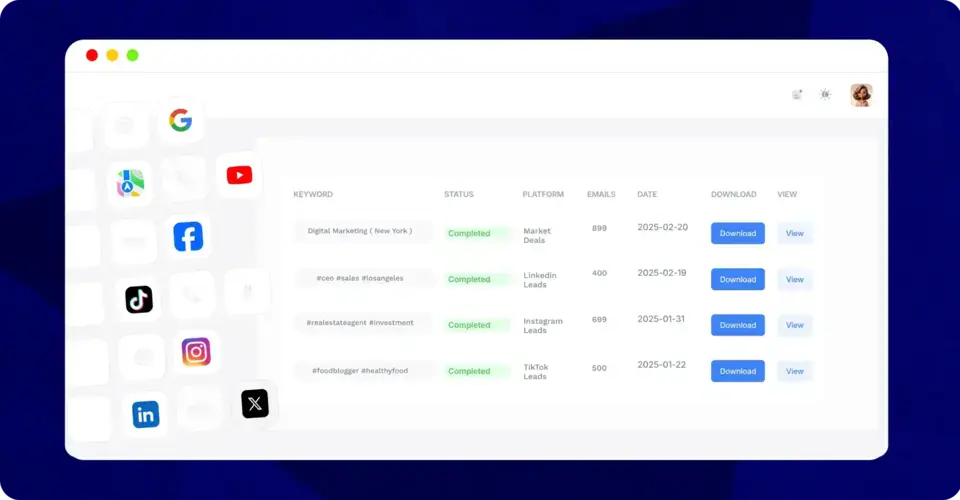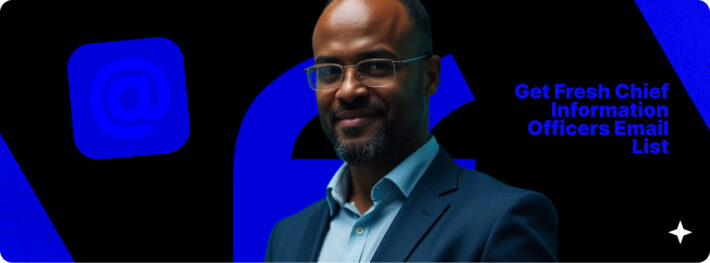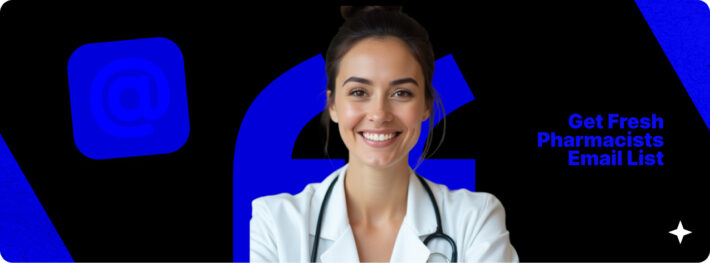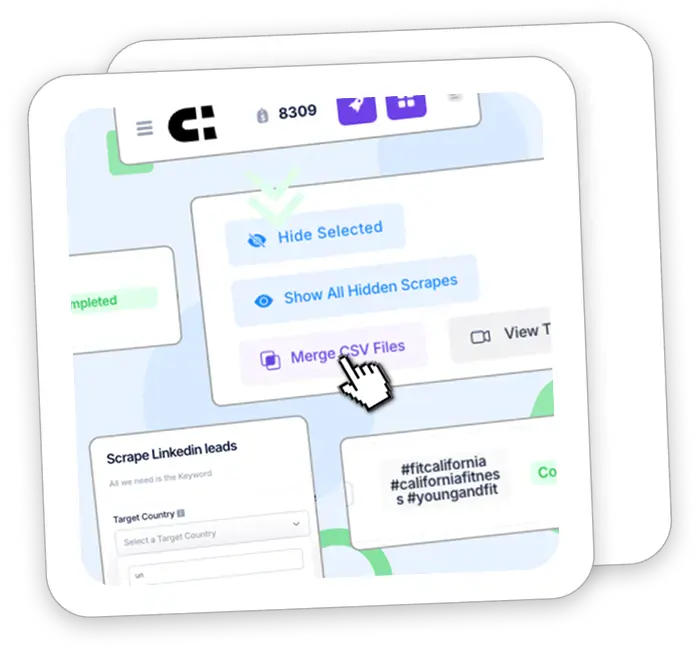Engineers Email List: Reach Your Target Audience with Precision
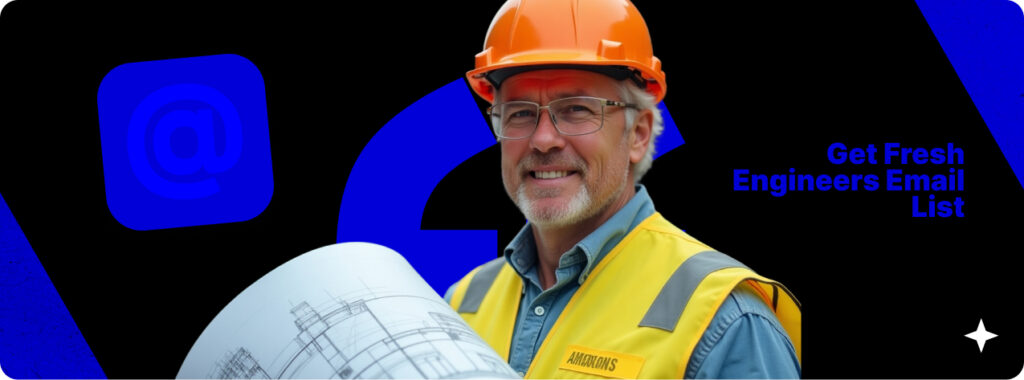
Looking for a fresh engineering email list in 2025? You can buy one or build your own. This guide shows both options. We’ll compare vendors, cover where to find engineers online, and explain how to build your own targeted list with an email scraper like IGLeads. You’ll learn how to filter by specialization, industry, or location, export to CSV, and keep your outreach compliant.
Top 5 ways to get fresh engineering email lists
Reaching engineers requires more than just scraping random directories. You need clean, segmented data that’s relevant to your target market, whether you’re going after civil engineers, software developers, or plant engineers. Here are five proven ways to build a reliable engineering email list in 2025:
1. Use engineering directories and databases
Industry-specific directories are a rich source of verified contact information. Platforms like Engineering360, ASME, and IEEE Member Directories include detailed professional profiles of engineers by discipline, certification, and location.
These directories offer:
- Full names, titles, and company info
- Areas of specialization (mechanical, electrical, etc.)
- Often, direct business email addresses or company contact forms
Tips for success:
- Filter results by sector, location, or certifications
- Combine multiple directories for broader reach
- Always double-check publication/update dates for freshness
2. Tap into licensing boards and associations
Most U.S. states require engineers to register through a licensing board. These public registries often include searchable databases with verified names, work status, and in some cases, business contact details.
Top sources include:
- State licensing boards (e.g., California Board for Professional Engineers)
- National Society of Professional Engineers (NSPE)
- Industry groups like AACE, SAE, or ASHRAE
These official directories are updated regularly and offer trusted data, ideal for outreach based on specialization, region, or credentials.
3. Build relationships on LinkedIn
LinkedIn is a goldmine for engineering contacts, especially those in leadership or technical buyer roles. Search by job title (e.g., “civil engineer,” “plant manager,” “senior design engineer”) and filter by industry, location, or years of experience.
Pro tips:
- Use personal connection requests (300-character limit)
- Engage with engineering groups and comment on technical discussions
- Follow company pages where engineers are likely to work
- Use Sales Navigator for filtered searches and connection insights
Once connected, you may gain access to public email addresses or initiate warm outreach via InMail.
4. Use automation tools like IGLeads.io to scrape engineers’ emails
Email scraping tools help you extract thousands of clean contacts from multiple sources without manual effort. IGLeads.io is designed to scrape emails by job title, location, or industry, perfect for engineering roles across sectors.
With IGLeads, you can pull emails from:
- LinkedIn (filtered by engineering roles)
- Google Maps (great for local engineering firms)
- Company websites and online directories
- Other B2B platforms and niche forums
The tool works on autopilot and delivers CSV files that plug directly into your CRM or cold email tool.
5. Purchase lists from trusted lead providers
If you need engineering contacts fast, buying lists from verified data providers can save time. Look for companies that specialize in technical or industrial verticals, and always verify that lists are opt-in and compliant.
Some providers offer:
- Filters by engineering type, geography, or job title
- Lists segmented by company size, sector, or budget
- High deliverability rates (95%+)
- GDPR, CAN-SPAM, and CASL compliance
Make sure the provider offers data replacement guarantees in case of bounces or inactive contacts.
Benefits of targeting verified engineering email addresses
Marketing to engineers through a verified email list offers huge advantages, especially when accuracy, deliverability, and segmentation matter most. Engineers are known for being analytical and time-conscious, so your campaigns need to land in the right inboxes and speak directly to their needs.
The biggest benefit? Precision. Verified engineering email lists reduce bounce rates by ensuring every contact is up-to-date, real, and active in a relevant technical field. This means your messages won’t get flagged as spam or buried in inactive mailboxes, protecting your sender reputation and improving open rates.
On the money side, email marketing already averages a $40 return for every dollar spent. With accurate engineer contacts, your return can climb even higher, especially in niche markets like manufacturing automation, CAD software, or civil infrastructure tools where deal sizes are larger.
High-quality engineering email lists let you segment by:
- Industry specialization (civil, software, mechanical, etc.)
- Location (city, region, or country)
- Seniority level (junior, senior, lead, director)
- Project type or technical focus (sustainability, robotics, construction, etc.)
This segmentation allows you to craft technical messages that resonate with your audience, not just generic sales copy. You could, for instance, create separate campaigns for electrical engineers in California and mechanical engineers in Texas using product demos or whitepapers tailored to their needs.
Verified lists also allow for multi-channel use. Beyond email, you can plug engineer contact data into LinkedIn campaigns, direct mail, CRM systems, or even phone outreach, provided you stay compliant with privacy regulations.
Finally, verified email lists save time. Instead of manually researching leads, you get a ready-to-use dataset that feeds directly into your marketing funnel. Engineers appreciate direct, well-targeted communication, and a strong contact list lets you deliver just that.
What to Check Before Buying an Engineering Email List (and How IGLeads Fits In)
Buying an engineering email list can be a shortcut to reaching highly technical audiences, but only if the data is accurate and relevant. Here’s what to check, and how IGLeads handles each factor.
1. How recently was the data updated?
Engineers often change companies, roles, or industries. A list verified months ago may already be outdated.
- Traditional vendors: Some update quarterly and claim 95%+ accuracy with timestamped records.
- IGLeads: Our email scraper pulls data in real time from public sources like LinkedIn, directories, and company websites. That means you’re getting the most recent contact details available, as fresh as the engineer’s last update.
2. Can the list be filtered by specialization or region?
Generic lists won’t work when you’re targeting engineers.
- Traditional vendors: Filtering depends on what they pre-collect (sometimes limited).
- IGLeads: You set your own filters. Search by discipline (mechanical, software, electrical), location (state, city, ZIP), seniority (junior engineer to CTO), or industry sector. You can create lists tailored to your campaign instead of being locked into static categories.
3. What’s the expected deliverability rate?
Deliverability matters because high bounce rates damage sender reputation.
- Traditional vendors: Some guarantee 95% deliverability with bounce-back replacements, often backed by manual checks.
- IGLeads: Since we scrape data directly, deliverability won’t match polished, hand-verified lists. But the advantage is volume and freshness; you can generate larger, up-to-date lists on demand, then run them through a verification tool to maximize inbox placement.
4. Is the list compliant with email marketing laws?
Compliance is non-negotiable when emailing engineers worldwide.
- Traditional vendors: May offer opt-in databases with compliance documentation.
- IGLeads: We only scrape publicly available data engineers share on professional platforms. It’s your responsibility to send campaigns responsibly, include opt-outs, use accurate sender info, and check CAN-SPAM, GDPR, or CASL rules depending on where you’re reaching out.
How to use an engineering email list for marketing
Once you’ve built or bought a quality list of engineers, it’s time to put it to work. Engineers are a no-nonsense audience. They value clarity, precision, and utility — and your campaigns should reflect that. Here’s how to get the most out of your engineering email list in 2025:
Share technical product updates or software solutions
Engineers love new tools that improve performance, accuracy, or efficiency. Whether you’re offering CAD software, workflow automation, or testing hardware, your emails should:
- Highlight time savings or precision improvements
- Include spec sheets, comparison charts, or demos
- Feature real-world case studies or product walkthroughs
- Offer free trials or engineering team discounts
Use the list to run segmented campaigns by discipline (e.g., targeting civil engineers with structural design tools and software engineers with code quality platforms).
Promote industry webinars, trainings, or certifications
Engineers are lifelong learners. If your brand offers certifications, product training, or industry webinars, your email list can be a strong acquisition tool.
Maximize event marketing by:
- Sending a 3–5 email sequence before each event
- Personalizing based on engineering field or seniority
- Including video teasers or speaker profiles
- Following up post-event with slides or recordings
Popular content formats include technical deep-dives, panel discussions with industry leaders, and training tied to professional development credits.
Run newsletters with engineering insights
A monthly or bi-monthly newsletter builds trust and brand awareness, especially when it delivers actual value. Great newsletter content for engineers includes:
- Emerging tech trends in their specific field
- Analysis of regulation or standards changes
- Engineering challenges with creative solutions
- Behind-the-scenes R&D stories or product use cases
Include a single, focused CTA (e.g., “Book a demo” or “Download whitepaper”) to guide readers without overwhelming them.
Create LinkedIn and multi-channel follow-up flows
The email list isn’t just for cold outreach. You can enrich it for LinkedIn matching, phone outreach, or retargeting via ads.
Pro tips:
- Match emails to LinkedIn for warm follow-ups
- Use phone or direct mail for high-value contacts
- Create landing pages with gated engineering content (e.g., “Top 10 Design Efficiency Tools for 2025”)
- Use marketing automation to stagger touchpoints across email and social
This keeps your brand in front of engineers who are harder to convert through just one channel.
Track, test, and iterate
Engineers appreciate data — and so should your campaigns. Use A/B testing for:
- Subject lines (e.g., “Boost Design Output by 40%” vs. “See How Top Engineers Cut Project Time”)
- Email formats (plain text vs. image-rich)
- Send times by region or role
Track metrics like open rate, click-through rate, and replies to refine your approach. A strong email list is an asset — but only when paired with a strategy that respects your audience’s mindset and time.
Build Your Engineering Email List the Smart Way
Did we convince you that using IGLeads to build engineering email lists is worth trying? With IGLeads, you don’t need coding skills or complex setups. Just set your filters, click “Start,” and export fresh, accurate contacts in minutes. Sign up today and start connecting with real engineers faster.
Essential Guides for Lead Generation
- B2B Lead Generation Solutions – Guide for 2025
- How to Build a High-Quality B2B Email List for Outbound Marketing
- Buy Email Lists for Marketing in 2025: Complete Guide to Business Leads
- Why Scrape Google Maps? Use Cases for Sales, Marketing & SEO
- B2C Lead Generation: The 2025 Playbook
- 15 Best Lead Generation Companies for 2025
- Best B2B email list providers in 2025
- Top Lead Generation Agencies Compared (2025)
- 18 Best B2B Lead Generation softwares in 2025
- Lead Generation Guide: Strategies & Tools for 2025
Frequently Asked Questions
An engineering email list is a curated collection of business email addresses belonging to engineers in various industries. These lists typically include details like job title, company, location, and specialization. You can use them for targeted marketing, outreach, or sales campaigns to promote technical products, training, or services directly to engineers.
B2B companies that sell tools, software, training, or consulting to engineers benefit most. Whether you’re promoting CAD solutions, industrial equipment, or automation tools, having access to verified engineer contacts helps you connect with decision-makers and reduce wasted outreach efforts. Recruiters and event organizers also use these lists to find qualified talent and attendees.
You can build segmented engineer lists by using tools like IGLeads.io, which lets you filter by job title, industry, and geography. Alternatively, professional associations, licensing boards, or directories like Engineering360 allow manual filtering. Many premium providers also sell ready-made lists sorted by engineering discipline, seniority, and region for immediate use.
Reputable providers ensure compliance by sourcing contacts from publicly available or opt-in data. Lists should include clear documentation of how emails were obtained and allow for easy opt-outs. Always verify that any list you purchase follows relevant laws like GDPR (EU), CAN-SPAM (U.S.), and CASL (Canada) to avoid fines and legal issues.
High-quality engineering email lists from verified sources can reach 90–95% accuracy and deliverability. Look for lists that are updated monthly and offer guarantees or data replacement in case of bounces. Deliverability depends on the freshness of the list and proper targeting — so always clean your list before launching a major campaign.
